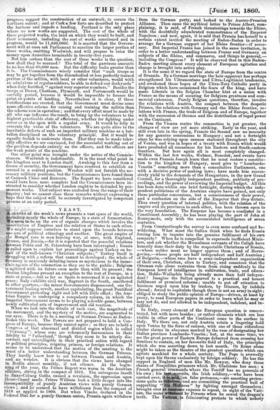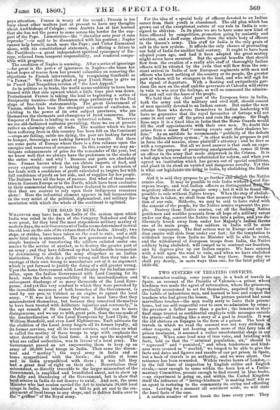kr SURVEY of the week's news presents a vast space
of the world, eluding to nearly the whole of Europe, in a state of fermentation. irs,Beena. be on the eve of organic changes which involve the constitution of Empires and the relation of States to each other. We might suppose ourselves to stand upon the bounds between one anu of political ethnology and another. The great empire of the Mongol race is seen braving war, at once, with England, Vrance, and Russia,—for it is reported that the, peaceful relations between Pekin and St. Petersburg have been interrupted ; Russia as called upon to explain her proceedings against Turkey on be- half of the well-known " Christian subjects ; " Turkey itself is struggling with a reform that cannot be developed ; the whole of Germany is anxiously debating issues as mysterious to the imme- diate agents of the commotion as they are to the public ; Belgium is agitated with its future even more than with its present; the Iberian kingdoms present an exception to the rest of Europe, in a state of peace,—but so far as Spain is concerned it is an agitated peace ; Italy exhibits civil war, flagrant in the South, smothered in other quarters,—the minor Governments dispossessed, one Go- vernment leading revolt, another capitulating, the great Pontifical Government protesting right and left with little effect ; the Aus- trian Empire is undergoing a compulsory reform, in which the Imperial Government seems to be playing a double game, between newly cultivated arts of improvement and old reaction. When we look into the details of each case, the magnitude of the movement, and the mystery of the motive, are augmented to our eyes. There is to be a meeting of German Princes at Baden- Baden this week. The Powers are not prepared to hold a Con- gress of Europe, because they cannot agree ; so they are to hold a Congress of that abnormal and divided region which is called " Germany"; whose sons are vehemently harmonious in their fidelity to " Fatherland," though they seem to be utterly dis- cordant and unintelligible in their practical action with regard to political principles, reigning princes, or foreign relations. It seems to be understood that the motive of the meeting is the want of a better understanding between the German Princes. They hardly know how to act between Prussia and Austria, and no wonder. It is obvious that the views have changed in Berlin almost monthly, if not oftener. At the begin- ning of the year, the Prince Regent was warm in the Austrian alliance, strong in the compact of 1818. The outrageous insult to Saxe-Coburg Gotha caused a revulsion, the oppression_ upon Hesse-Cassel made Prince William look a little deeper into the incompatibility of purely Austrian views with purely German views ; and he seemed to have withdrawn from the compact of 1818 as applied to 1860. But when Vincke declared in the Federal Diet for a purely German union, Prussia again withdrew
rogress, suggest the construotion of an outwork, to secure the from the German party, and looked to the Austro-Prussian Alliance. Then came the mythical letter to Prince Albert, com- plaining, it is said, of French threatenings towards the Rhine, with the doubtfully adumbrated remonstrance of the Emperor Napoleon ; and now, again, it is said that Prussia has herself to a certain extent invited the meeting of Baden-Baden in order to arrange for a German support of her Rhine frontier—if neces- sary. But Imperial France has joined in the same invitation, in order to a better understanding between France and Germany on subjects of the Rhine, and commerce, and things in general,— including the Congress ? It will be observed that in this Baden- Baden• meeting almost every element of European agitation and change is brought into active play.
It is the same if we regard the state of Europe from the centre of Brussels. By a German marriage the heir-apparent has perhaps strengthened his Ultramontane and Ultra-Legitimist tendencies, and awakened those hopes of the Ultra-Tory Catholic; party in Belgium which have occasioned the fears of the king, and haYe made Liberals in the Belgian Chamber hint at a union with France as the means of securing for Belgium greatness and com- mercial extension. Purely Belgian questions, therefore, involve the relations with Austria, the compact between the despotic Princes, the relations with Germany and the Rhine frontier, re- lations with France, the trade of Belgium and of Europe, together with the succession of thrones and the distribution of regal power on the Continent.
From the Vienna centre the commotion is yet greater, the changes of view are yet more striking. Early in the year, and still even late in the spring, Francis the Second saw no necessity for any genuine concessions to Hungary; and not a fortnight since he was relying upon cannon stationed throughout the city of Venice, and was in hopes of a treaty with Russia which would have precluded all uneasiness for his Eastern and South-eastern frontiers. But here again all is most completely changed. Within the last few weeks, Hubner, Benedek, and events have made even Francis Joseph learn that he must restore a constitu- tion to the kingdom of Hungary, must give to " Lombardo- Venetia" something more than a consultative Parliament, one with a decisive power of making laws ; have made him succes- sively yield to the demands of the Hungarians, in the new Grand Council, for a thoroughly independent position, publicity of pro- ceedings, and the power of reviewing the Imperial budget. All this has been done within one brief fortnight, during which the inde- pendent politicians of the Austrian empire have gained, not only these particular concessions, but a consciousness of their power, and a confession on the side of the Emperor that they dictate. Thus every question of internal polities, with the relation of the empire and its provinces to each other, has been thrown open to the very foundation. The Emperor has become a coadjutor in a Constituent Assembly ; he has been playing. the part of John at Runnymede, only with the accumulated intelligence of seven centuries.
From Constantinople the survey is even more confused and be- wildering. What must the Sultan think when he finds Russia forcing him to inquire into the genuine fulfilment of his own compacts ? When he is compelled to supersede inefficient Minis- ters, and ask whether the Mussulman servants of the Caliph have honestly done their duty by the respectable Christians of Bosnia, —whose nobles must no longer oppress them ; and of Herze- govina —whose people are half independent and half Austrian ; of Bulgaria,—whose race have a semi-independent organization of their own, Christian, alien to Turkey, and conscious that the Ottoman rule alone restrains them from rising suddenly to the European level of intelligence in cultivation, trade, and educa- tion, Moldo-Wallachia being already more than half indepen- dent ? Imagine the Sultan spurred to a practical and honest fulfilment of promised reforms; • unable to put off attention to business urged upon him by traders, by Giaours, by infidels abroad ; forced to capitulate though there is not an army in sight ; obliged to study the public opinion of Europe—driven' at least by proxy, to read European papers in order to learn what he may or may not do, and not allowed to be independent, indolent, and in- fallible !
In Italy, every element of the European question is concen- trated, but with more besides ; or rather elements which are less visible in other parts of the Continent come to the surface in Italy. We there see, not only Austria retain a lingering hold upon Venice by the force of cannon, with one of those ridiculous titular claims in abeyance marked by the rase of designating her Italian province Lombardo-Venetia; but, at the same time, we see the great power of Eastern Europe debarred from crossing her frontiers to sustain, on her favourite field of Italy, the principles which she was asserting down to last month. Or Rome alone might be taken as the theatre of the greatest questions which can agitate mankind for a whole century. The Pope is avowedly kept upon his throne exclusively by foreign soldiery. He has the support in England of men like Mr. Bowyer, who deny those chains of Neapolitan prisoners which Mr. Gladstone has seen ; a French general commands where the Pontiff has no generals of his own ; his soliwruits, the Irish soldiery,—who have been carried over, iti is,said, on false pretences,—are asserting preten- sions quite as fabulous, and are committing the practical bull of supporting " his Holiness " by fighting amongst themselves ; brought over at immense expense to repeat, in sight of the Vati- can, the scene witnessed by Perseus when he sowed the dragon's teeth. The Vatican_ is fulminating protests to which nobody
pays attention. • France is weary of the sound ; Prussia is too busy about other matters just at present to have any thoughts about Archbishops of Cologne; even Austria has at last learned that she has not the power to come across the border for the sup- port of the Pope. Lamorioiere—the " chevalier sans peur et sans reproche "—is said to be discontented with his position ; Naples cannot help- herself, much more the Pope ; and Victor Emmanuel alone, with his constitutional statesmen, is offering a future to the iontificate—a great independent spiritual episcopacy of Eu- rope, relieved from temporal responsibility, and rendered compa- tible with progress. •
The condition of Naples is amusing. After a series of ignorings —for great is the power of ignorance in Naples—she bases her latest hopes of rescue from her present calamities on removing the objections to French intervention, by recognizing Garibaldi as " a Power." We want the ghost of poor Frank Stone to give us in Punch that Neapolitan version of " the Last Appeal."
As in politics so in trade, the world seems suddenly to have been turned with that side upward which a little time past was down. Protectionist France is taking the lead in beginning a series of Reciprocity treaties—the Huskisson stage preliminary to the Peel stage of free-trade statesmanship. The great Government of Vienna, which has been the strongest advocate of exclusion, is yielding to the power of its own subject provinces, who are themselves the claimants and champions of freed commerce. The Emperor of Russia is leading in an industrial reform. Wherever we sea old-fashioned seclusion prevailing, there we see at present rather, an alarming state of trade. The weather which we have been suffering from in this country has been felt on the Continent —crops are failing, cattle are dying, the poor are looking forward to hunger, Sovereigns are looking forward to tumult. But there are some parts of Europe where there is a firm reliance upon. the energies and resources of commerce. In this country we may an- ticipate enhancements of price for the remainder of the year, but we know well that we always have the preference in the stocks of the entire world ; and why ? Because our ports are absolutely free. France knows when she can obtain imports of food, and every exporting country is looking forward to an extension of her trade with a confidence of profit calculated to inspire. her with full confidence of profit on her side, and of suppliiiiior her people. The Italians have all the hope of success. But what of those coun- tries in Eastern Europe or in the North, which have been exclusive in their commercial dealings, and have declared to other countries that they are content to rely upon their indigenous resources alone Here the industrial element appears in full fermentation in the very midst of the political, diplomatical, and military fer- mentation with which the whole of the continent is agitated.



























 Previous page
Previous page